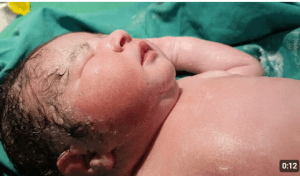A Guide to Caring for Your Newborn
Bonding and Security at the Birthing Pavilion
The first few hours and days after birth are a critical time for bonding between a mother and her newborn. At the Birthing Pavilion, we encourage skin-to-skin contact as much as possible during this period. This helps stabilize the baby’s blood sugar, body temperature, heart rate, and breathing, while also calming and soothing the infant. The mother’s body also benefits, as skin-to-skin contact helps the uterus contract and stimulates milk production if breastfeeding.
In addition to promoting bonding, the Birthing Pavilion prioritizes the safety and security of you and your baby. Each newborn is given an identification band and ankle tag to prevent accidental mix-ups or unauthorized removal from the unit. For your baby’s protection, they must be transported in a bassinet outside your room, and staff will question anyone carrying a baby.

Essential tests and procedures
In the first few days after delivery, your newborn will undergo several important tests and procedures to ensure their health and identify any potential issues early on:
- Newborn Metabolic Screen (PKU Test): This blood test checks for hormonal and metabolic disorders that, if caught early, can be managed to prevent serious complications.
- Jaundice Screening: A bilirubin blood test checks for jaundice, a common condition where excess bilirubin causes the skin to appear yellow. Prompt treatment can prevent more serious effects.
- Hearing Screening: A simple test checks for hearing loss, which, if detected early, can lead to early intervention and better outcomes.
- Hepatitis B Vaccine: This important first vaccine helps protect your baby against a serious liver infection.
- Oxygen Testing: A painless test checks for potential heart conditions that could affect oxygen levels.
While these tests may cause some brief discomfort, our staff will use soothing techniques like sugar water and skin-to-skin contact to minimize any distress for your baby.
Feeding Your Newborn
Newborns have very small stomachs and need to eat frequently, often every 2–3 hours. It’s important to feed your baby whenever they show hunger cues, like sucking on their hands or rooting, rather than waiting until they cry. Crying can cause air to enter the stomach, leading to gas and fussiness.
Breastfeeding is the healthiest option for both you and your baby, providing antibodies to fight infection and reducing the risk of conditions like asthma, diabetes, and SIDS. Our nurses and lactation consultants are available to assist with any breastfeeding challenges. If you choose to formula feed, we’ll make sure you know how to do so safely and effectively.
Monitoring your baby’s wet and dirty diapers is a great way to gauge their feeding and overall health. Expect at least 1 wet and 1 dirty diaper on the first day, increasing by 1 each subsequent day until reaching 6–8 of each per day by the first week.
Sleeping and Soothing Your Newborn
Newborns need lots of sleep, but the transition to sleeping outside the womb can be difficult. We recommend creating a safe sleep environment in the bassinet, with your baby sleeping on their back without loose blankets or toys. Falling asleep with your baby in your bed increases the risk of SIDS and suffocation.
When your baby is fussy, try soothing techniques like skin-to-skin contact, swaddling, shushing, and pacifiers. It’s normal for newborns to cry for extended periods, so don’t hesitate to ask friends or family for help if you feel overwhelmed. Remember, you should never shake a baby, as this can cause serious injury.
Preparing to Go Home
Before discharge, our staff will help you complete the birth certificate, schedule your baby’s first appointments, and connect you with any community resources you may need. We’ll also ensure your car seat is properly installed and teach you how to use it safely.
Throughout your stay, don’t hesitate to ask your nurse, the resource coordinator, or your baby’s doctor any questions you have about caring for your newborn. We’re here to provide the support and guidance you need to give your little one the best possible start.
More detail follow you other post related baby new born
